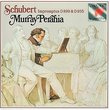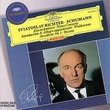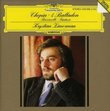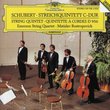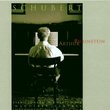| All Artists: Franz [Vienna] Schubert, Robert Schumann, Sviatoslav Richter Title: Schubert: 'Wanderer' Fantasy; Schumann: Fantasy & Papillons Members Wishing: 1 Total Copies: 0 Label: EMI Classics Release Date: 1/25/2005 Genre: Classical Styles: Chamber Music, Forms & Genres, Fantasies, Historical Periods, Classical (c.1770-1830), Modern, 20th, & 21st Century Number of Discs: 1 SwapaCD Credits: 1 UPC: 724356296121 |
Search - Franz [Vienna] Schubert, Robert Schumann, Sviatoslav Richter :: Schubert: 'Wanderer' Fantasy; Schumann: Fantasy & Papillons
 | Franz [Vienna] Schubert, Robert Schumann, Sviatoslav Richter Schubert: 'Wanderer' Fantasy; Schumann: Fantasy & Papillons Genre: Classical
|
Larger Image |
CD DetailsSimilar CDs |
CD ReviewsTwo Fantasies and a Butterfly Robin Friedman | Washington, D.C. United States | 10/31/2006 (5 out of 5 stars) "The Russian pianist Sviatoslav Richter (1915 -- 1997) was revered for his magnificent, highly personal playing of Schubert and Schumann. This CD, appropriately included in EMI's "Great Artists of the Century" series includes three masterpieces for piano solo which Richter made his own: Schubert's 'Wanderer Fantasy" and Schumann's Fantasy in C, opus 17 and Papillons opus 2. With Richter at the height of his powers on three treasured works, this CD is difficult to resist. Schubert's "Wanderer" Fantasy is on my shortest list of music that I have known over the years that is dear to me. Richter's reading is a deserved classic. Schubert composed the work in 1822, just after laying aside what would become known as his "Unfinished" symphony. It is a grand, stunning composition written in a flamboyant, virtuosic style that Schubert otherwise used only rarely. It is a showpiece, full of bravura; and Schubert himself remarked of it "the devil take it, I can't play it." The work is composed in four movements around a theme that Schubert used in his song "The Wanderer". The second movement consists of a series of variations on the theme of the song. Listen to the final variation and Richter's playing of the long series of runs and filigree high in the register over a cello-like singing of the theme. The work is full of enormous crashing chords, sweeping arpeggios and long runs, together with Schubert's singing themes and a gamut of emotion ranging from the forceful and hopeful to the deeply sad, as in the second movement. Richter offers a reading that is both powerful and showy and also attuned to the many nuances and changes of moods in Schubert's score. The 'Wanderer' has been a source of inspiration to me and to many listeners and composers. Robert Schumann's was a great admirer of Schubert's 'Wanderer". His own Fantasy opus 17 is also a virtuosic work, probably Schumann's greatest composition for solo piano, but of a different spirit than Schubert's. Schumann's three-movement Fantasy is a wayward, moody and highly passionate work. As was most of Schumann's early piano music, it was composed in the midst of and reflects his stormy courtship of Clara Wieck. It can be heard to capture the difficult passionate courtship in the opening movement, Schumann's determination to see the courtship through in the middle movement, and the consummate expression of love in the finale. The opening muovement alternates between the passionate, arresting opening theme and quieter more reflective material. The movement is difficult to hold together, but Richter does so here. Schumann himself said that the first movement was 'more impassioned than anything I have ever written." The second movement consists of a wayward march with a contrastingly quiet middle section. It closes with a devilishly difficult passage for the soloist with big chords and wide skips. The finale is slow,quiet and pensive, reflective of the feelings of a lover for the beloved. There are two large climaxes in the course of what is a lyrical conclusion to a passionately romantic work. The third movement of the Fantasy includes quotations from Beethoven's song cycle, "To the Distant Beloved" opus 98. Schumann adored this work which is one of Beethoven's most romantic compositions and written on a theme -- a difficult love -- close to Schumann's own. Papillons, opus 2 is an early example of Schumann as a composer of piano minatures along the line of his more famous "Carnaval" and "Scenes from Childhood." Papillions consists of twelve short pieces, some of them highly virtuosic, which alternate between the dreamy and the lyrical and the passionate and forceful sides of Schumann's personality. There are songlike themes in this work, graceful light dances, syncopated rhythms, and large heavily chorded sections with long movements in octaves. This reading captures a live performance and Richter brings out the intense, yearning, and temperamental character of Schumann's erratic gifts. Schubert's 'Wanderer' is almost an incomparable work for me. It is here together with two other great works of romantic piano music definitively played. Robin Friedman" Again Canzone | California | 02/14/2006 (4 out of 5 stars) "Yet another re-packaging of Richter's 'Wanderer'; EMI must really believe in this recording. As well it should, since this is one of the better versions of the Fantasy in the catalog. Lots of folks still think this is the best-ever choice, and while I have some reservations, it is definitely exciting. I'm not at all sure that Schubert would have anticipated quite so much banging around the keyboard, but Richter is certainly no novice with this material. The other pieces are fine, though listeners might want to audition Kempff and Brendel recordings, too (if still available)."
|

 Track Listings (19) - Disc #1
Track Listings (19) - Disc #1